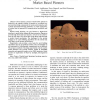Free Online Productivity Tools
i2Speak
i2Symbol
i2OCR
iTex2Img
iWeb2Print
iWeb2Shot
i2Type
iPdf2Split
iPdf2Merge
i2Bopomofo
i2Arabic
i2Style
i2Image
i2PDF
iLatex2Rtf
Sci2ools
142
click to vote
ICRA
2005
IEEE
2005
IEEE
Learning Opportunity Costs in Multi-Robot Market Based Planners
— Direct human control of multi-robot systems is limited by the cognitive ability of humans to coordinate numerous interacting components. In remote environments, such as those encountered during planetary or ocean exploration, a further limit is imposed by communication bandwidth and delay. Market based planning can give humans a higher-level interface to multi-robot systems in these scenarios. Operators provide high level tasks and attach a reward to the achievement of each task. The robots then trade these tasks through a market based mechanism. The challenge for the system designer is to create bidding algorithms for the robots that yield high overall system performance. Opportunity cost provides a nice basis for such bidding algorithms since it encapsulates all the costs and benefits we are interested in. Unfortunately, computing it can be difficult. We propose a method of learning opportunity costs in market based planners. We provide analytic results in simplified scenarios...
| Added | 25 Jun 2010 |
| Updated | 25 Jun 2010 |
| Type | Conference |
| Year | 2005 |
| Where | ICRA |
| Authors | Jeff G. Schneider, David Apfelbaum, Drew Bagnell, Reid G. Simmons |
Comments (0)

